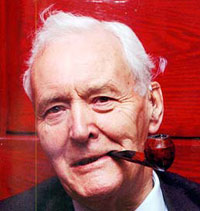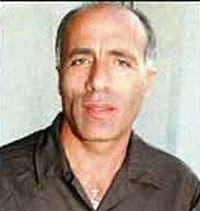|
UK Supplied Israel With Atom Bomb Materials: BBC
 |
|
Doctors and activists warned that Israel's infamous Dimona is posing a grave threat to the region.
|
LONDON,
March 10, 2006 (IslamOnline.net & News Agencies) - Britain, a key
player in a nuclear row with Iran, supplied Israel in the 1960s with
plutonium and other restricted materials used in developing atomic
weapons, a BBC investigation has revealed.
Citing
top secret documents obtained under freedom of information laws and
interviews with former government officials, the BBC's Newsnight
program said on Thursday, March 9, that Britain provided the samples
as Israel developed its secret Dimona nuclear reactor, Agence
France-Presse (AFP) reported Friday.
In
1966, Israel asked Britain for a 10-milligram sample of plutonium -- a
mere fraction of the four kilograms required to make a nuclear bomb,
according to the BBC.
Britain
also supplied Israel with hundreds of shipments of other materials
which could have helped a nuclear weapons program, including compounds
of uranium, lithium, beryllium, tritium and heavy water.
In
2003, Israel decided to cut off ties with the BBC over a repeat
broadcast of a documentary named "Israel's Secret Weapons",
which showed pictures of the Dimona nuclear reactor and the biological
institute in Nes Tziona, with the narrator saying, "Which country
in the Middle East has not declared the nuclear and biological weapons
in its possession?"
PM
in the Dark
 |
|
Benn said that he thought then prime minister Harold Wilson had also been kept in the dark.
|
Tony
Benn, Britain's technology minister at the time, however, told the
program that the deals took place without his knowledge even though he
had been the man in charge of exporting nuclear material.
"On
the question of plutonium for Israel, no reference was ever made to
me. I mean the hypocrisy is what sticks in my nostrils," Benn
said.
The
former minister indicated that he thought then prime minister Harold
Wilson had also been kept in the dark.
"My
belief is he didn't know, but he might have done I can't rule that
out."
The
Foreign Office rejected the request, while the Ministry of Defense
warned that the sale could have "significant military value"
as the smaller amount could be used for experimental purposes,
according to the BBC.
But
Michael Michaels, a senior civil servant, wrote to protest strongly at
the Foreign Office decision and managed to have it overturned.
Michaels,
who served as Britain's representative at the International Atomic
Energy Agency -- the UN's nuclear watchdog -- for 14 years, was Jewish
and considered to be very well-disposed towards Israel, according to
the report.
Peter
Kelly, British intelligence's top expert on the Israeli nuclear
weapons program at the time, told Newsnight he believed Michaels knew
Israel was trying to build the bomb but had dual loyalties -- to both
Britain and Israel.
"Helpful"
 |
|
The
material helped Israel "to search and to develop their program and to
build not only atomic weapons but hydrogen bombs," Vanunu said.
|
Upon
hearing the revelations, Mordechai Vanunu, who spent 18 years in an
Israeli prison for lifting the lid on the Dimona nuclear plant, said
he was glad the news about Britain's deals with Israel was coming out.
"It
will be very helpful to fight the nuclear proliferation in the Middle
East and to force Israel to do something to take part in the abolition
of nuclear weapons in the Middle East," he told Newsnight in a
telephone interview from Israel.
Vanunu
said he hoped the revelations would force Britain to put pressure on
Israel to open Dimona for inspection in the same way as London was
pressuring Tehran about its disputed nuclear drive.
He
also said he thought the material sold by Britain to Israel in the
1960s aided Israel in developing atomic weapons.
The
material helped Israel "to search and to develop their program
and to build not only atomic weapons but hydrogen bombs," Vanunu
said.
Arab
leaders and politicians have frequently called for a Middle East free
from weapons of mass destruction, criticizing the West's double
standards with Iran as it turns a blind eye to Israel's nuclear
arsenal.
The
UN nuclear watchdog had asked Israel to give up its secret arsenal of
nuclear weapons to head off an arms race in the Middle East.
Israel,
India and Pakistan are the only countries with nuclear facilities that
have not signed the NPT, which was initiated in 1968 to stop the
spread of nuclear weapons through inspections and sanctions.
While
the US is pressing Iran over its alleged nuclear arsenal and is
accused of having misled and lied to the world over Iraq's alleged
WMDs, Israel's nuclear arsenal has grown from an estimated 13 nuclear
bombs in 1967 to 400 nuclear and thermonuclear weapons, according to
US media reports.
The
Washington Post has also revealed that Israel has succeeded in
modifying US-made cruise missiles capable of carrying nuclear warheads
to be launched from submarines. (Click
here to read the history of Israel's nuclear arsenal.)
Doctors
and environment activists have further warned that Israel's infamous
Dimona is posing a grave threat to the life of Israeli citizens, those
of neighboring countries and the region's fauna and flora.
Vanunu
has said that reactor became very old, and unless it shuts down,
another "Chernobyl" disaster might occur again in the
region, referring to the 1986 explosion of the Russian nuclear
reactor.
|